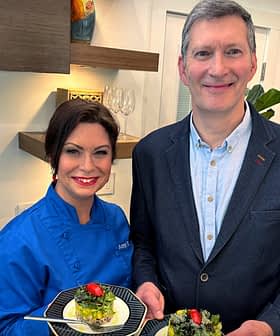Master Milling Course Returns to UC Davis
The three-day course will go over every step of the olive oil production process with field trips to local olive oil mills to see those steps in action.
The University of California, Davis Master Miller Certificate Course returns to the Robert Mondavi Institute for its eleventh edition in September.
The course is a huge first step in demystifying the milling process so we can innovate and produce better oils.
Forty attendees will learn about the international olive oil industry, olive oil chemistry and harvesting and milling best practices. The goal of the program is to provide tips and guidance for olive growers and millers so that they can produce higher quality oil more efficiently.
This year’s course will take place over three days instead of four and cost less than it previously has.
“We decided to try a little bit of a different format to make it more affordable for people,” Dan Flynn, the director of the UC Davis Olive Center and one of the instructors on the course, told Olive Oil Times. “We still think the cost of the course is a good investment and it will pay for itself many times over in higher quality and better efficiency.”
According to a recent survey from the UC Davis Olive Center, 90 percent of respondents believed that the course material would improve their quality or efficiency and 72 percent said that the course was “very likely” to lead to higher profitability for their own operations.
“Without this class, we would not be able to make high-quality, award-winning extra virgin olive oil,” Malcolm Bond, a previous attendee and co-owner of Bondolio, told Olive Oil Times. “The price of this seminar is a bargain. As an investment, the first year’s crop paid for the class many times over.”
During the three days all of the same material will be covered, but more efficiently, according to Flynn. The first two days will be held in the Silverado Sensory Theater and are more academic. The last day will include several field trips to local mills where the attendees will see what they have learned being put into practice, and they will have the opportunity to network and try various local products, including olive oil and wine.
“The course covers some of the most advanced approaches to milling available, but also covers the basic fundamentals,” David Garci-Aguirre, another previous attendee and vice president of operations and master miller at Corto Olives, told Olive Oil Times.
“What I learned immediately is that a lot of the old milling ‘lore’ circulating the industry in California simply wasn’t true or backed by any evidence. The course is a huge first step in demystifying the milling process so we can innovate and produce better oils.”
After a brief overview of the global olive oil sector, the instructors begin with what happens to the olives in the field and how this influences the quality of the oil.
“Before we even get to the processing, there’s talk of the things happening out in the field and how they have an impact on olive oil quality,” Flynn said. “So things like the moisture content of the fruit are really important for the grower to determine how much oil they are going to get and also the quality of the oil.”
This is followed by tips on how to determine the best time to harvest the olives as well as protecting the quality of the fruit between the tree and the crusher.
“You can measure the oil accumulation in the fruit and when that hits a plateau then you are not going to get any more oil accumulating and at that moment you’re also probably going to have your highest phenolic content,” Flynn said. “So the course talks about how the grower can determine when that point is.”
These steps will be followed by a thorough walkthrough of the entire milling process, beginning with assessing the fruit once it arrives in the mill and finishing with the best practices for storing and packaging the final product.
“When I started milling and took this class the first time […] I learned that every year the harvest is different and that small adjustments to processing equipment along with harvesting techniques has a great effect on producing quality extra virgin olive oil,” Larry Treat, the mill manager at Lucero Olive Oil, told Olive Oil Times.
The course will also entail a tasting session, but with a twist. The attendees will be able to taste olive oil that has been harvested from fruits where something went wrong along the way. Flynn said that this allows millers to really appreciate how some small differences have large impacts on flavor.
“There will be some tastes that give examples of just how much difference it makes to harvest the olives in a span of a few weeks on the flavor profile of the oil using the same variety,” he said.
“We will also taste some oils made with fruit that was damaged in some way. In the past, we’ve had fruit that has had frost damage [and] what the attendees found is the profile of that oil will have this sort of stewed fruit quality and it will also oxidize very quickly.”
Along with Flynn, Leandro Ravetti and Selina Wang will be among the course instructors. Ravetti is an agricultural engineer with more than 20 years of olive oil production and research experience. Wang is the research director of the UC Davis Olive Center and the leader of its olive oil lab.
The course is set to run from September 26 to 28 and registration ends September 17. The price is $875 until August 10 and $1075 afterward. Register online here.








